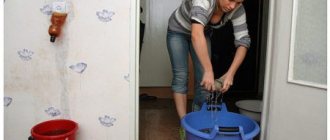Why call a specialist?
There are the following situations when you need to call a plumber to your home:
- installation of a water supply system (for apartments in new buildings, commissioned for final finishing);
- water pipe leak detection;
- major repairs of the water supply system (replacement of pipes);
- installation of water meters;
- removing blockages;
- the need to replace the bathtub, toilet, sink;
- adjusting a loose tank or sink;
- removing air from batteries;
- replacement of heating radiators;
- replacement of mixers;
- installation of heated towel rails, etc.
Attempts by residents of an apartment building to fix problems on their own often lead to dire consequences.
Communications break down, a leak occurs, causing damage to the property of the apartment owner and his neighbors. In order not to risk their own money and nerves, citizens turn to the services of private craftsmen or plumbers from the housing office.
Examples when management specialists were obliged to remove blockages, but did not do so
Below are a few examples of the management company’s disregard for the problems of clients submitting applications on a first-come, first-served basis:
- The toilet is clogged. The man independently found out that it was the toilet that was clogged, contacted the Criminal Code, and left a statement asking for the blockages to be cleared as soon as possible. The application was accepted and told to expect a plumber in 2 days. No one showed up on time, and attempts to clarify the reasons for unprofessional behavior failed. As a result, the person decided to speed up the process and turned to RICO. The problem was solved within two hours.
- The riser is clogged. The RICO craftsmen changed the internal wiring (installed hidden communications), everything was beautifully designed, and the satisfied customer accepted the job. But during commissioning (when opening the water supply valves), a lack of pressure was discovered. A subsequent inspection revealed problems with the riser capacity. The client decided to call a representative of the management company (for free, after all), and the result of the call surprised him. The plumber who arrived refused to remove the blockage and suggested turning to “those people who changed the pipes,” they say, it was their job. With the hint “always ready to help for a modest payment.” As a result, the customer, together with a representative of RICO, went to the management company’s office, wrote a complaint, and three days later got a visit from a new technician. But not to remove the blockage, but to completely replace the riser pipes.
The conclusion is simple. Workers of the management company can and should be involved in removing blockages in Khabarovsk, but on the condition that the riser or an adjacent fragment of pipes is clogged. In other situations, it is better to immediately call RICO. This approach will help save nerves and time.
How to call a plumber from the housing office to your home
To call home a plumber from the housing office or management company, three simple steps are enough:
- Clarification of utility service contacts. The phone numbers and address of the management company will be found on the payment slip; they are often posted in the entrance. If the necessary information is not available, residents receive it from neighbors or on the Internet.
- Call or personal visit to the utility service. The citizen describes the situation, stipulates the urgency of the work, and concludes an agreement.
- Coordination of the time when the plumber from the housing office will arrive, waiting for the visit of the master.
To call a plumber at their place of residence, citizens have the right to contact commercial organizations that provide repair services for water supply systems. The work is performed on a paid basis, but with high quality and quickly. In order not to make a mistake in choosing a private master, it is recommended to read reviews in advance on independent resources on the Internet (for example, specialized forums) or ask for recommendations from your management company.
When should a plumber arrive?
The timing of the arrival of a plumber from the management company, housing and communal services at the house to carry out work is regulated by Gosstroy Resolution No. 170 dated September 27, 2003. The regulatory act states that monitoring the performance of hot and cold water supply systems is the task of the emergency dispatch service of an apartment building. It operates around the clock. Minor faults requested by residents are corrected immediately.
The resolution states that the service is obliged to urgently eliminate blockages and breaks in the sewer system. Its personnel and equipment are in full readiness to quickly respond to requests from apartment owners.
Housing office specialists are given eight hours to replace a non-functional toilet. Repair of faucets or heating system elements is carried out within 24 hours. To replace a bathtub or sink, the service is given one week. Often, the terms for the provision of services are specified in the contract concluded by the residents of the house with the management company.
If the plumber did not arrive on time, and the delay caused damage to the apartment owners, his compensation becomes the responsibility of the housing office. Repairs are carried out free of charge.
Advantages and disadvantages of contacting employees of the housing and communal services management company
There are the following advantages of calling a plumber from the UK to your home:
- the company is responsible for the condition of cold water and hot water systems, therefore it attracts experienced and qualified craftsmen to work;
- Some services are provided free of charge: it is already included in the monthly utility bill;
- paid services are provided at an affordable price;
- One phone call is enough to call a specialist.
If a housing and communal services plumber makes a mistake that causes damage to a tenant, he will be able to file a claim with the Criminal Code and receive compensation for the damage caused.
Is it worth calling a private master?
Calling a paid plumber can reduce your waiting time.
Craftsmen from housing and communal services often do not have the necessary equipment, while their colleagues from commercial firms are equipped with the latest technology. The service is provided quickly and at a high level.
The pitfall of turning to private plumbers is cases of fraud. Commercial firms quote one price, but in practice it turns out that they have to pay 2-3 times more. The second disadvantage is the dispersion of responsibility. If the company that carried out the repairs closes after a month and the pipes burst, the apartment owner will not be able to make a claim and compensate for the damage.
In order to call a private master to your home and not get into trouble, it is important to read reviews in advance and rely on recommendations from friends and acquaintances.
Housing and communal services problems. To pay or not to pay a plumber?
Let's look for the answer on the Internet, where such questions are often discussed. Although we are unlikely to discover anything unexpected: as a rule, residents complain about the greed and impudence of housing and communal services workers; plumbers/electricians - due to the greed and arrogance of the residents. And it cannot be said that the claims of both sides are unfounded. More precisely, three sides.
The third is the management company, which often has questions for both residents and its employees. To residents - for timely payment of rent, alterations in apartments and even outside them, damage to property, etc. To employees - for fulfilling paid private requests. And more often not in terms of the quality of performance, but in terms of payment for services.
Previously, housing and communal services workers had two complaints: they came drunk and did poor work. But that's earlier. The classic “drunk plumbers” ended about ten years ago. Inept, in general, too. The competition is great!
Of course, mistakes in work always happen to everyone. Now the main complaint has become what was previously taken for granted: the housing and communal services foreman wants to receive payment for his work.
Photo: pixabay.com
Let's turn to the Internet.
- The management company's plumber demanded payment for cleaning the toilet. Should we pay something, since we already pay for maintenance every month?
- The child broke the “pimples” on the gas stove. Calling a repairman cost twice as much as repairing the “pimply”. Don’t forget to ask for a receipt, otherwise they will make a mistake and then have to pay again.
- They dropped it and couldn’t get the item out of the toilet. The plumber got it - for a fee.
- Two plumbers responded to a sewer blockage. They charged a fee on a “per person” basis, arguing: if you don’t pay, we won’t come next time.
- Do I need to pay if a faucet or battery leaks in a non-privatized apartment? What if you also have benefits?
And further, in the direction: “ Should we pay? »
It depends on what. And to whom.
In fact, there are very clear rules regarding what plumbing work and services are not included in the maintenance fee. There are general building communications: electrical wiring, water supply, gas supply. Branches go from them to apartments. Between the riser and apartment communications, automatic switches are installed (in the electrical network), shut-off valves - valves (in the gas and water supply networks). Before the machines and valves there is common property, after that it is yours.
Another option: the border between “house” and “apartment” is the metering devices.
- All work on “your” communications is not included in the cost of maintenance and is paid separately.
Photo: pixabay.com
The cost of the same services in different management companies may vary.
Moreover, even in municipal utilities in different areas of the city, prices may vary. But the difference in prices between “private owners” and “municipal owners” is usually small. And the quality of performance depends on the person, and not on whether he works in housing and communal services, REU or management company. Or he doesn’t service your home at all, but came from “outside”.
By the way, any operating organization provides a guarantee for the work performed. Only, unlike private craftsmen and small firms, it will not disappear. The main thing is to keep the receipt for payment for services and/or the certificate of their completion and your application number.
But let's say we have a guarantee. Still, one of the main complaints against public utilities remains: expensive! And I personally completely agree with this.
That is, for some, of course, it’s inexpensive, but people have different opportunities. But the prices are the same for everyone. Official. By the way, they do not include the material - you buy it yourself. Or ask a master - especially since he knows exactly what you need to buy.
If, of course, he needs it “for the sake of it.” He will receive a maximum of 50% of your payment. Or less: for example, in my organization - 30%. Minus, of course, taxes. And then - after payment is received. We will, of course, do the job normally, but hardly more than that.
But some people will not rush to such a “paid” application, and it will take a long time to do the work, and with very average quality. Alas, the human factor has not been canceled. I repeat: we have professionals working for us, but we shouldn’t idealize people.
The human factor has not been canceled Photo: Depositphotos
However, there is an “average” option that any of my colleagues would recommend: negotiate with the master personally. Of course, you will not receive an official guarantee. But the vast majority of craftsmen value their reputation, and they work in one place for years. At the same time, he will earn more, you will pay less... perhaps. Someone, in good conscience, will ask you for a fee that is significantly lower than the official one. And someone will be happy that now they can get the full amount. What to say? Agree, it all depends on you! Sometimes a small problem will be fixed for free...
There are also some issues that are difficult to resolve.
For example: who will compensate for damage after flooding due to a burst battery? Or if, after replacing the battery in the apartment, a pipe leaked higher or lower along the riser? And the neighbors think that it was your workers who “touched” the common riser?
Suppose, in the second case, the guilt of your workers (and, accordingly, yours) still needs to be proven.
It is more difficult to understand who owns the burst battery. I personally did not find a clear answer in the available sources. Or the owner - if it has shut-off valves. Either at home - then repairs are free! — carries out the Criminal Code. Unless the apartment owner will have to purchase the radiator itself.
If a self-replaced battery leaks, the fault is most likely yours. Often we, not trusting the “crooked” workers of the DEZ, hire craftsmen from outside. “Theirs” will only turn off the riser, but the “company” will do all the work. Has there been a leak or some other problem? No problem, contact the “firms”! If anything, let them compensate for the damage...
Photo: Depositphotos
Perhaps, in theory and with strict adherence to the rules, it is possible otherwise. But modern practice is something like this.
Tags: housing and communal services worker, plumbing work, housing and communal services, utilities
Payment for plumbing services
To call a plumber at your address, it is enough to agree with the management company. The resident should prepare for the fact that the specialist’s work will be paid. These are services related to the replacement of equipment at the initiative of the owner, and the elimination of problems that arose due to his fault.
The cost of providing other services to the housing maintenance company is included in the receipt, which is paid monthly by the owner. The column remains on the payment bill regardless of whether he uses the services of plumbers or not.
What is included in the list of free services
Calling a plumber from the housing office to your home does not always require payment. The list of services provided free of charge is agreed upon by apartment owners at a general meeting. House owners solve two interrelated issues:
- what services will be provided free of charge;
- what will be the utility payment included monthly in the “premises maintenance” column for cavitation.
The decisions made are enshrined in an agreement concluded with the management company. The company's liability for failure to perform or poor-quality provision of services to owners is fixed.
As a rule, the list of plumbing services provided free of charge includes the following:
- eliminating leaks in pipes;
- strengthening rickety toilets, sinks, bathtubs;
- cleaning of internal sewerage;
- eliminating blockages in the water supply of an apartment building;
- adjustment and adjustment of hot water and cold water systems;
- replacement of poorly functioning batteries, etc.
The list of free housework can be clarified with the management company.
What services are provided for a fee?
The following services are provided on a reimbursable basis:
- connecting a washing machine or dishwasher;
- replacement of batteries at the request of the resident;
- installing new faucets if the old ones are functioning normally;
- replacement of plumbing fixtures (for example, sink);
- installation of heated towel rails;
- eliminating blockages caused by the homeowner.
In Art. 210 of the Civil Code of the Russian Federation states that the burden of maintaining property rests with the owner of the apartment. This means that he is obliged to pay for the services of a plumber called to eliminate the breakdowns that have arisen.
Search for truth
The situation can be clarified by contacting utility workers. With a privatized apartment, everything is absolutely clear, since the owner must maintain it. Representatives of the municipal property management committee behaved rather strangely when they were asked a question about the role of the authorities in the repair of municipal housing.
They flatly refused to give any comments to employees of one of the most respected print publications, and without explanation. Officials invited those in need to submit written complaints, which will be considered on a first-come, first-served basis.
In war, all means are good, and owners of municipal apartments can be advised to write not only to various committees, but also directly to the heads of cities and various municipalities. If the appeal remains without an intelligible answer for a long time, you will have to go to the prosecutor’s office and begin to defend your interests in court.
Of course, no one can remain without basic household amenities for long. It is quite reasonable to replace the plumbing at your own expense and keep all payment documents for later presentation to government officials when the court obliges them to reimburse the expenses incurred.
What documents are issued to the property owner?
If a housing and communal services plumber provides services to a resident of an apartment building, he is required to issue supporting documents. These include:
- Agreement for the provision of services (for example, replacement of radiators, pipes, installation of meters). Indicates the rights, obligations, mutual responsibility of the parties.
- The certificate of completion of work confirms the provision of the service.
- Record in the warranty card for the equipment used. For example, if a plumber was hired to install radiators, a note is made “Installation was carried out under contract No.... from nn.nn.nnnn.”
If the installed radiators subsequently require warranty repairs, become damaged, and water floods the neighbors, the owner will have proof that the installation was carried out by representatives of the management company. He will have the right to file a claim and receive compensation for losses incurred.
If a plumber visits a citizen’s apartment due to the need to check the condition of the meters or utilities of the house, he is obliged to present the apartment owner with an identification card and documentation confirming his authority to enter the home.
What the current legislative norms “say”
When analyzing the current legal norms, it becomes clear that owners of municipal housing will not be able to prove their case in all cases. Yes, the concept of a standard service life of plumbing fixtures exists. Even 25 years ago, construction standards were developed and approved regulating the maintenance, reconstruction and repair of buildings and structures related to social and cultural purposes. They clearly state that the standard service life of ceramic elements of sanitary equipment is 20 years, and plastic analogues are 30 years.
But the digital values indicate only the minimum operating period. In reality, any element can last much longer or much less. The issues of direct replacement of common property in multi-apartment residential buildings are covered by Decree of the Government of the Russian Federation No. 491 of August 13, 2006. From the text of this document it follows that bearing the costs of maintaining property in proper condition is the responsibility of the owners of residential premises.
When should a plumber arrive?
The timing of the arrival of a plumber on call is regulated by Decree of the State Construction Committee No. 170 of September 27, 2003. After calling a plumber to your home, the management company or housing and communal services will register the request in a log and describe the problem that has arisen.
At the same time, the management of the management company must ensure the arrival of the plumber within the following time limits:
- if the pipe is severely damaged, a mechanic arrives immediately (or the call is transferred to the emergency service);
- any blockages or leaks in the sewer system must be repaired urgently after receiving an application;
- The plumber must replace the toilet tank within 8 hours (working time is counted);
- repair of mixer and heating equipment is carried out within 24 hours;
- To replace a bathtub, sink, and other plumbing structures, a specialist is given 1 week.
The period begins from the moment the application is submitted. If the plumber does not arrive within the allotted time, it is recommended to duplicate the request and at the same time find out the reason for the non-fulfillment of the first one. If the failure of a plumber to show up on time caused damage to the owners of the apartment building, then the repairs are carried out at the expense of the housing and communal services.
Each service company has an agreement that describes in detail all repairs, prices and deadlines for their elimination. Be sure to study it.










